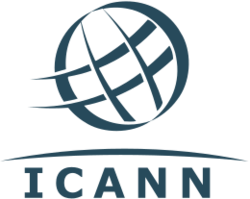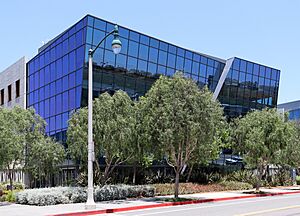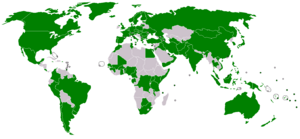ICANN facts for kids
 |
|
| Abbreviation | ICANN |
|---|---|
| Founded | September 30, 1998 |
| Type | 501(c)3 organization |
| Focus | Manage Internet Protocol numbers and Domain Name System root |
| Headquarters | Los Angeles, California, United States |
|
Key people
|
|
|
Employees
|
428 |
| Internet history timeline |
|
Early research and development:
Merging the networks and creating the Internet:
Commercialization, privatization, broader access leads to the modern Internet:
Examples of Internet services:
|

The Internet Corporation for Assigned Names and Numbers (ICANN) is a global group that helps manage the Internet. It is a nonprofit organization based in the United States. ICANN makes sure the Internet stays stable and works smoothly for everyone.
It coordinates important databases for Internet names and numbers. This includes managing Internet Protocol (IP) addresses and the Domain Name System (DNS). Think of the DNS as the Internet's phone book. It translates website names like "example.com" into IP addresses that computers understand.
ICANN's main goals are to keep the Internet working well. It also wants to encourage fair competition. The organization aims to include people from all over the world in its decisions. It often uses the motto "One World. One Internet."
ICANN was officially started in California on September 30, 1998. Its first leader was Esther Dyson. It is now located in Los Angeles, California.
Contents
How Did ICANN Start?
Before ICANN, a researcher named Jon Postel handled many of these tasks. He worked at the University of Southern California. As the Internet grew, the U.S. government wanted a new organization to take over.
In 1998, the U.S. Department of Commerce suggested creating a new group. This group would manage Internet names and addresses. The idea was to make this management private and global. ICANN was formed because of this plan.
ICANN was set up as a nonprofit group. It was meant to serve the public. Jon Postel was a founder and was going to be its first Chief Technology Officer. Sadly, he passed away unexpectedly.
How ICANN's Role Changed
For many years, ICANN worked under a contract with the U.S. Department of Commerce. This meant the U.S. government had some oversight.
In 2009, ICANN signed an agreement. This agreement confirmed ICANN's commitment to a global way of working. It aimed to include many different groups in its decisions.
A big change happened on October 1, 2016. On this date, ICANN became fully independent. It was no longer under the direct oversight of the U.S. government. This was a major step for the Internet's global management.
Since it started, ICANN has faced some challenges. On June 10, 2024, Kurt Erik Lindqvist was announced as the new president and CEO of ICANN. He started his role on December 5, 2024.
Important Events for ICANN
ICANN has been involved in several key events. These events helped shape how the Internet works today.
Disputes Over Domain Names
In 2003, ICANN had a big disagreement with VeriSign. VeriSign offered a service called "Site Finder." This service redirected users to a search page if they typed a wrong website address. ICANN believed this service caused problems. VeriSign eventually stopped the service.
Later, VeriSign sued ICANN. They wanted to clarify ICANN's power. A settlement was proposed. It would allow VeriSign to raise fees for .com domains.
New Internet Addresses
In 2005, ICANN introduced several new top-level domains (TLDs). These are the last parts of website addresses, like .com or .org. Some new ones included .eu, .asia, .travel, .jobs, .mobi, and .cat.
In 2011, ICANN made a huge decision. It voted to allow almost any name for new TLDs. This meant companies and groups could create their own unique Internet endings. For example, a company could have ".brandname" as a TLD. This also allowed non-Latin characters, like Chinese or Arabic. Applying for a new TLD cost a lot of money.
Managing IP Addresses
On February 3, 2011, ICANN announced something important. It had given out the last of its original IPv4 addresses. These are the numerical addresses for devices on the Internet. This meant the world was running out of these addresses. This event highlighted the need for IPv6, a newer system with many more addresses.
Protecting Consumers Online
In 2008, ICANN took action against some registrars. These registrars were not following rules about keeping contact information updated. This information is important for fighting online spam and fraud. ICANN does not deal with spam directly. But it works to ensure registrars follow their agreements.
How ICANN Is Organized
ICANN is set up as a nonprofit group. It has a board of directors with 16 members. These members come from different parts of the Internet community.
ICANN also has three main groups called "Supporting Organizations":
- The Generic Names Supporting Organization (GNSO) handles policies for general TLDs like .com.
- The Country Code Names Supporting Organization (ccNSO) deals with policies for country-specific TLDs like .uk or .jp.
- The Address Supporting Organization (ASO) works on policies for IP addresses.
ICANN also gets advice from several committees. These committees include:
- The Governmental Advisory Committee (GAC): This group has representatives from many governments worldwide. They give advice on public policy issues.
- The At-Large Advisory Committee (ALAC): This committee represents individual Internet users from around the globe.
- The Root Server System Advisory Committee (RSSAC): This group advises on how the Internet's root server system works.
- The Security and Stability Advisory Committee (SSAC): These experts study security issues related to ICANN's work.
Governmental Advisory Committee Members
The GAC has representatives from 179 countries. It also includes 38 observer organizations. These observers include groups like the European Commission and the African Union Commission.
GAC Observers
- African Telecommunications Union
- Asia-Pacific Telecommunity
- Caribbean Telecommunications Union (CTU)
- Commonwealth Telecommunications Organisation (CTO)
- Council of Europe
- Economic Commission for Africa (ECA)
- European Broadcasting Union
- European Organization for Nuclear Research (CERN)
- European Space Agency
- International Labour Office
- International Telecommunication Union (ITU)
- International Criminal Police Organization (INTERPOL)
- International Red Cross and Red Crescent Movement
- Latin American Association of Telecom Regulatory Agencies (REGULATEL)
- League of Arab States
- New Partnership for Africa's Development (NEPAD)
- Organisation for Economic Co-operation and Development
- The Organization for Islamic Cooperation
- Organization of American States
- Organisation internationale de la Francophonie (OIF)
- Pacific Islands Forum
- Secretariat of the Pacific Community (SPC)
- Inter-American Telecommunication Commission (CITEL)
- International Criminal Court
- United Nations Educational Scientific and Cultural Organization (UNESCO)
- Universal Postal Union
- World Bank
- World Health Organization (WHO)
- World Intellectual Property Organization (WIPO)
- World Meteorological Organization
- World Trade Organization
Trusted Community Representatives
ICANN also relies on a group called Trusted Community Representatives. These people are not part of ICANN. They are volunteers from the wider Internet community. Their main job is to help keep the Internet's security keys safe. They do this by taking part in special "key ceremonies."
How Decisions Are Made
ICANN holds public meetings around the world. These meetings help people from different regions take part. Decisions and reports from these meetings are published online.
Some people have said that ICANN needs to be more open. They believe more discussions should be public.
There was once talk about the United Nations taking control of ICANN. But in 2005, world governments agreed not to get involved in ICANN's daily technical work. Instead, they created an Internet Governance Forum. This forum gives advice on the future of Internet governance.
What ICANN Does
ICANN has several important tasks.
Solving Domain Name Problems
One of ICANN's jobs is to help solve problems with domain name ownership. This is done through the Uniform Domain-Name Dispute-Resolution Policy (UDRP). This policy helps resolve conflicts quickly and fairly. It avoids needing to go to traditional courts. If you register a domain name, you agree to follow the UDRP.
Changes to Whois Information
Whois is a tool that lets people find out who registered a domain name. In 2013, a group suggested changing Whois. They recommended keeping most registration information private. This information would only be shared for specific reasons. These reasons include research, buying/selling domains, and stopping abuse.
Ideas for ICANN's Future
There have been ideas to make ICANN more international. Some want it to become a global organization under international law.
Montevideo Statement (2013)
In 2013, leaders from Internet organizations released a statement. It was called the Montevideo Statement. They were concerned about global monitoring of the Internet. They called for ICANN to become more global. They wanted all groups, including governments, to have an equal say. This was partly a reaction to news about government surveillance programs.
Global Meeting on Internet Governance (2014)
In 2014, Brazil hosted a big meeting on Internet governance. This meeting included representatives from governments, businesses, and civil society. It aimed to discuss the future of Internet governance.
The U.S. government announced in 2014 that it would step back from overseeing ICANN's core functions. This transition happened in 2016.
Concerns About New Domain Names
The expansion of TLDs has caused some concerns.
The .sucks Domain
ICANN approved the controversial ".sucks" domain name. This domain is used to express negative opinions about something. Companies often register their brand names with ".sucks" to protect them. This is because the company that owns .sucks charges high fees for trademark holders. Many people, including politicians, have criticized this. They say it feels like a "shakedown" for brands.
Other Domain Disputes
ICANN has also been involved in other domain name disputes. For example, there was a long disagreement over the ".islam" and ".halal" domains. These domains are still on hold.
In 2019, ICANN decided to remove the price cap for .org domains. This meant the price could go up. This decision was met with a lot of opposition. Later, the owner of the .org domain proposed selling it to an investment firm.
Also in 2019, ICANN decided to give amazon.com exclusive rights to the .amazon domain. This decision came after a seven-year dispute with a group representing countries in the Amazon region.
Images for kids
-
ICANN meeting in Los Angeles, 2007. The sign refers to Vint Cerf, who worked on the Interplanetary Internet.
See also
 In Spanish: Corporación de Internet para la Asignación de Nombres y Números para niños
In Spanish: Corporación de Internet para la Asignación de Nombres y Números para niños
 | William L. Dawson |
 | W. E. B. Du Bois |
 | Harry Belafonte |



